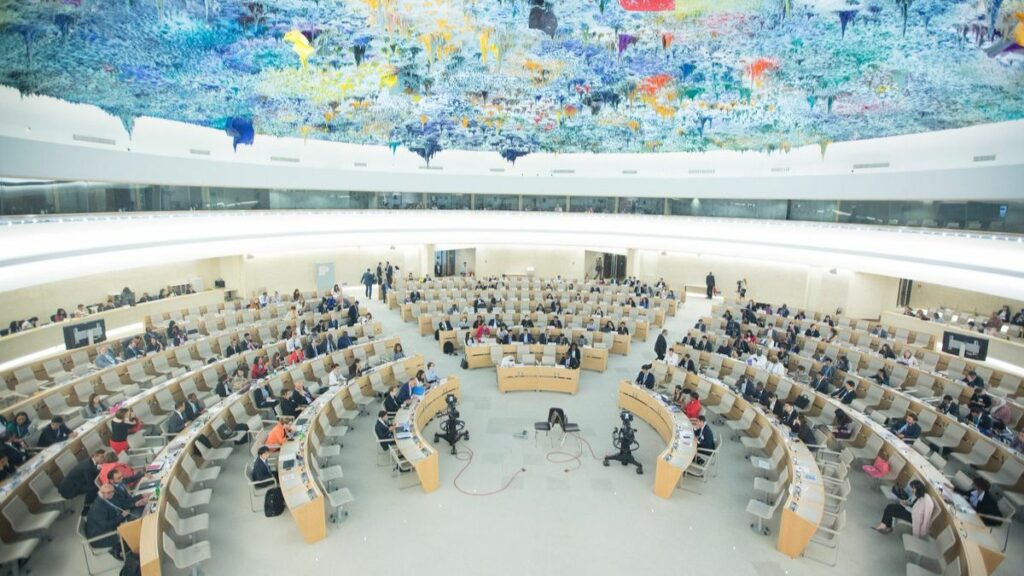On July 17, the last day of its most recent session, the United Nations Human Rights Council (UNHRC)—a Geneva-based, powerful inter-governmental body within the UN system—adopted a resolution sponsored by over fifty nations that claims to seek “elimination of all forms of discrimination against women and girls” and urges every nation on earth to “guarantee universal access to sexual and reproductive health services.” If you are unfamiliar with UN terminology, this language may seem laudable—until you learn that “sexual and reproductive health services,” or SRHS, is actually UN-speak for abortion. Under the pretense of protecting women’s rights, the UNHRC is advocating the ultimate violation of the ultimate human right, the right to life, which has been recognized by a UN treaty: “the child, by reason of his physical and mental immaturity, needs special safeguards and care, including appropriate legal protection, before as well as after birth.”
The UNHRC resolution seeks to justify the taking of innocent life by insisting that abortion is an “essential health service” during the COVID-19 pandemic, and does so by claiming to affirm the Universal Declaration of Human Rights—whose opening line insists on “the inherent dignity” and “equal and inalienable rights of all members of the human family.” Well did Professor Mary Ann Glendon decry the “opportunism” that leads “nations and interest groups… to use selected provisions [of the UDHR] as weapons or shields, wrenching them out of context and ignoring the rest.” Unfortunately, the resolution is not an anomaly; the UNHRC has long attacked the right to life under the guise of protecting women’s rights.
Nor is this the UNHRC’s only encroachment upon fundamental rights recognized by the UDHR, whose message, says Professor Glendon, is “that rights have conditions—that everyone’s rights are importantly dependent on respect for the rights of others, on the rule of law, and on a healthy civil society.” Of course, the UDHR leaves no doubt as to the foundation of a healthy civil society: “The family is the natural and fundamental group unit of society and is entitled to protection by society and the State.” Tragically, the family has also come into the cross-hairs of the UNHRC, as I saw at one of its sessions when two internationally prominent gay activists were treated as conquering heroes as they met with groups of delegates to promote a document they had helped create called the Yogyakarta Principles. This cunningly crafted manifesto is premised on the notion that homosexual “rights” reign supreme over every other human right and prevail over every incompatible principle and provision in any constitution, culture, law, or otherwise. The Yogyakarta Principles aspire to nothing less than a total transformation of human society and would brook no opposition or dissent, even by religious voices. All would be required to bow before the new idol.
No wonder that a jurist and religious leader of the stature of Dallin H. Oaks has warned, referring to the Yogyakarta Principles, “Religious freedom needs defending against the claims of newly asserted human rights,” and any “effort to have governments invade religion to override religious doctrines or practices should be resisted by all believers,” who should also respect “the very real civil rights (such as free speech) of their adversaries or any other disadvantaged group.” The Yogyakarta Principles have been the driving force behind the barrage of sexual-orientation-and-gender-identity (SOGI) resolutions by the UNHRC as it has sought to force its agenda on all nations, notwithstanding their sovereign laws and religious beliefs.
The UNHRC’s war on sovereignty and rights continues largely unnoticed and unreported, but its methods have been exposed by the US Commission on Unalienable Rights in its recently released Draft Report calling for resistance to “attempts at creating new rights through means that bypass democratic institutions and procedures,” since “nation-states, through their laws and political decisions, are the main guarantors of human rights.” The report also censures “the prodigious expansion of human rights” throughout “the many different UN agencies,” and warns that “recasting contestable policy preferences as fixed and unquestionable human rights imperatives promotes intolerance, impedes reconciliation, devalues core rights, and denies rights in the name of rights.” At risk, says the report, are those foundational and divinely endowed rights proclaimed in the Declaration of Independence.
With so much hanging in the balance, we must indeed resist this deceptive and dangerous erosion of our sacred rights. It is time for all who believe in life, family, and faith to boldly stand up and speak out—for ourselves and future generations.
